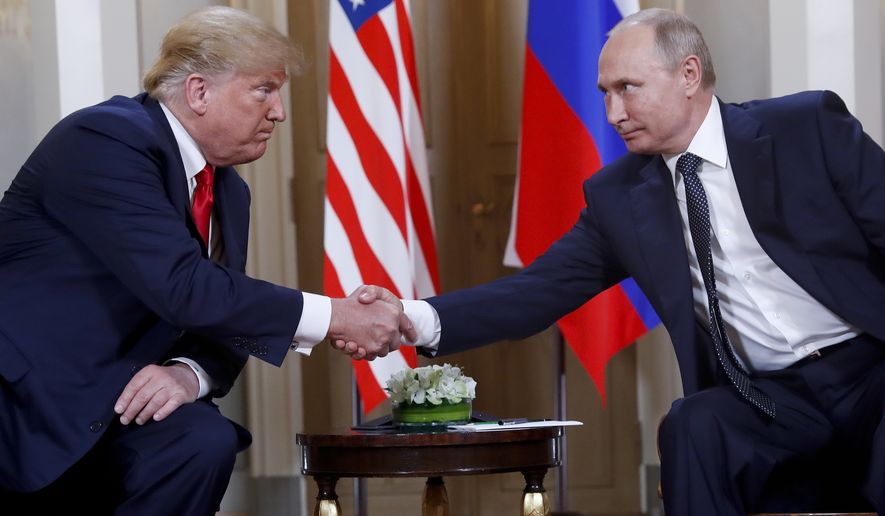
For 18 months, the Trump administration has taken numerous firm actions against the Kremlin, and foreign policy analysts say President Trump’s charm offensive toward Vladimir Putin in Helsinki on Monday shouldn’t overshadow that.
Hundreds of Russian businesses, power brokers and influential oligarchs remain under tough U.S. economic sanctions, and the administration is considering even harsher penalties against Russian officials if Moscow moves ahead with its controversial Nord Stream 2 natural gas pipeline, which would funnel Russian natural gas through the Baltic Sea to Germany.
“Trump has done some really provocative things. He sent dozens of diplomats back. He’s attacked into Syria. He’s sent anti-tank missiles to eastern Ukraine, very much against [Russia’s] interests,” said retired Army Lt. Col. Daniel Davis, a senior fellow at Defense Priorities, a Washington foreign policy think tank.
“We spend way too much time focusing on personality and style over substance and actual policy,” Mr. Davis said. “It’s fair game to criticize the president, like many of us did with [former President Barack] Obama. But you still have to focus on the policy.”
In addition to the host of economic sanctions and expulsion of diplomats, the Trump administration also has embraced direct military assistance to Russia’s adversaries in a way the Obama administration did not.
Earlier this year, for example, the U.S. confirmed it had completed its first delivery of Javelin anti-tank missiles to Ukraine, which remains on edge and fearful of further Russian aggression after Moscow’s 2014 annexation of Crimea and ongoing assistance to pro-Russia rebels in eastern Ukraine.
The Javelins went through after Mr. Trump had separately approved the sale of another batch of the anti-tank missiles to Georgia, another former Soviet republic that faced its own military showdown with Russia a decade ago.
While the administration is taking clear actions to counter Moscow, however, some regional experts argue Mr. Trump is simultaneously engaged in a careful strategic dance to decouple Russia from China, which the White House sees as the more serious long-term threat to the U.S.
Ariel Cohen, a senior fellow at the Atlantic Council, told The Washington Times on Tuesday that “Mr. Trump is trying to reach out to Mr. Putin and trying to detach Russia from China because he sees China as our principal competitor, both strategically and economically.”...
‘Italy with nukes’With the prospect of a wider strategy to counter China as a backdrop, some analysts argue that it is simply wrong to view the Helsinki summit as a capitulation by the president to a major foreign rival — since Russia can hardly be described as an equal foe to the United States.“People are too caught up and still locked in Cold War thinking,” said Col. Davis, the Defense Priorities scholar. “You say ‘Russia,’ and that’s synonymous in their minds with the Soviet Union and the juggernaut of the Warsaw Pact. That’s not what exists any more.”“Russia has the same economy as Italy. It’s like Italy with nukes,”
